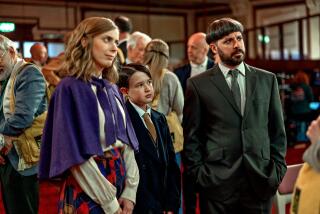The risk of playing religion straight
- Share via
IF REAL LIFE wasn’t tough enough for the Episcopal Church -- an IRS investigation of a parish, secession threats, gender and sexuality controversies -- a new television program depicts a priest in freefall.
According to “The Book of Daniel,” which debuted Friday on NBC, sex, drugs and martinis loom larger in a cleric’s life than hunger, poverty and unemployment. In the premiere, Daniel Webster, the rector of a suburban New York Episcopal parish, contended with pill popping, drug dealing, embezzlement, extramarital sex and a longhaired Jesus figure who could front a grunge band.
The litany of sin was enough to spark a new skirmish in the culture wars. Even before the show aired, the conservative American Family Assn. launched a letter-writing campaign to NBC executives complaining that the program “mocks” Christianity.
This misses the point. “The Book of Daniel” doesn’t disparage Bible-believing Christians. Instead, it demonstrates the difficulty of turning serious religion into entertainment. Religion can be played as sentimental, spooky or satire, but doing it straight -- think “ER” repotted in a synagogue -- is hard to pull off.
In large part, this is because we treat religion as a special case. Whether we’re atheists, agnostics, secularists or believers, we all hold religious leaders to higher standards. Doctors, lawyers and politicians can be noble and flawed -- isn’t that why we love Jack Bauer (“24”), Gregory House (“House”) and the late, great Leo McGarry (“The West Wing”)? But imagine any of these characters with a collar or a kippa, and tell me it doesn’t make you squirm.
Maybe because we see priests, rabbis and imams as stand-ins for the divine, we expect more of them.
“The Book of Daniel” frustrates our expectation.
At the heart of the show is a poignant dilemma: Daniel’s basic decency is compromised at every turn. Seeking strength, cheap grace or maybe just a moment’s peace, he pops pills, his integrity dangling precipitously each time he reaches for a prescription painkiller.
The crush of problems he confronts within his family would try the patience of a saint, which may explain why he is forever fingering the medicine bottle. His daughter sells pot, and his teenage son is having sex with the daughter of the church’s warden. His father, a bishop, is censorious, the diocesan bishop is critical, and his congregants are demanding. His brother-in-law has absconded with his secretary after embezzling church funds intended for a new school, and his sister-in-law is a flake with a penchant for “threesomes.” His mother has Alzheimer’s, he has lost a son to leukemia, and his confidant, a Catholic priest, has Mafia connections.
There’s an element of schadenfreude in watching the miseries of the ruling class -- we’re in moneyed-mansion, country-club, African-American-housekeeper territory here. But the show’s narrative excesses don’t entirely explain my discomfort with it. I’d like to see “Daniel” struggling more with his ministry -- but in the public sphere. What would Daniel do with IRS investigators, seceding congregations and culture warriors?
“Life is hard,” Jesus tells Daniel, and the rector’s psychic bruises remind us that the practice of faith comes at a cost. We’re just not accustomed to seeing a man of God pay the price.
More to Read
Sign up for Essential California
The most important California stories and recommendations in your inbox every morning.
You may occasionally receive promotional content from the Los Angeles Times.










